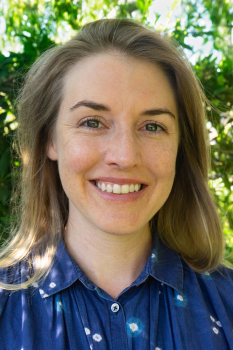Morgan Rogers
Morgan Rogers

Education:
MA, UCLA
BA, UCSB
Areas of Interest:
Community Engaged Urban Design, Socio-Environmental Systems, Urban Biodiversity, Urban Ecology, Urban Form, Urban SustainabilityEmail:
rogers.morganlee@gmail.comMorgan is a PhD student in Urban Planning, a Graduate Student Researcher with the Luskin Center of Innovation (LCI), and a NRT-INFEWS trainee. Her research falls within socio-environmental systems scholarship and uses a combination of geospatial, ecological modelling, and urban data science methods within an “Ecology for the City” framework. She uses these methods and framework to investigate the relationship between urban form, biodiversity and ecosystem service outcomes. This framework brings together urban ecology and design with an inclusive, iterative process involving a multitude of stakeholders to translate ‘knowledge-to-action’ for urban sustainability. She aims to work with policymakers and communities to enhance urban ecosystem health and climate change resilience through urban design.
At LCI she works on the Strategic Growth Council Climate Change Research Program funded project, “Micro-climate Zones: Designing Effective Outdoor Cooling Interventions”. The project uses community-engaged microclimate modeling approaches to evaluate heat mitigation strategies in Transformative Climate Communities and other communities in regions disproportionately burdened by rising temperatures. As a NRT-INFEWS trainee, she is researching urban design solutions that enhance ecosystem health and support biodiversity while providing co-benefits such as cooling neighborhoods and reducing energy costs.
Morgan has a Masters in Urban and Regional Planning with a focus on environmental analysis and policy from UCLA. Prior to coming to UCLA, she earned her B.A. from UCSB and worked in the field of environmental sustainability and policy for over six years. Her approach to environmental policy was grounded in two principles that she now carries over to her research: the importance of understanding biophysical processes to create effective interventions, and community engagement to ensure equitable access to environmental benefits.
